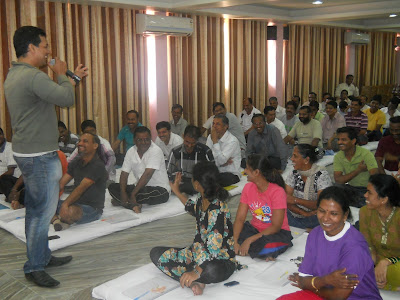Masoom is an NGO set up with a passion for establishing quality
education in night schools, through its “Night School Transformation
Programme”. Masoom began its intervention in the year 2006 with a research project
supported by “Partners for Urban Knowledge Action and Research” (PUKAR). Having
examined the conditions of night schools in Mumbai through this research,
Nikita Ketkar founded Masoom in the year 2008.
Masoom's vision is to support
youth “learn while they earn”, and mission is to enable night school
students achieve their full potential through educational and policy support. Masoom’s model is the only comprehensive model being implemented in the
history of night schools. Currently they are working with 15
night schools in Mumbai, and will be expanding to 30 night schools in 2013-14.
 |
 |
| Vocational guidance session |
Night schools are those that function in the evenings, catering to students who work during the day. Night schools are primarily attended by disadvantaged youth who have earlier had to drop out of school to take up jobs to financially support their families. However, they still nurture the desire to pursue their education – this is what brings them to night schools even after a long day at work. Night school students are typically in the age group of 15 to 25 years.
There are 210 night schools in
the state of Maharashtra, out of which 150 are in Mumbai. Of the 20,000 youth
that study in night schools all over Maharashtra, around 10,000 to 15,000 study
in Mumbai night schools run by various trusts.
Challenges faced by night schools
Due to the lack of infrastructure and poor supervision, the quality of education in night schools is dismal, which leads to a high drop-out rate among students. Some of the hurdles are -
- Night schools function for only 3 hours a day as compared to the 5-6 hours of day schools, but have the same syllabus to cover.
- No Government policy recognizes or support night school education.
- Most teachers work in day schools, and teach at night schools as a second job.
- Shortage of funds for running the schools.
- Low attendance despite continuous enrolment drives due to the numerous external challenges faced by night school students.
Masoom has developed a
three-pronged intervention model to improve the quality of education in night
schools. Called the ‘Night School Transformation Programme’, this intervention
has been designed to address the unique needs of night schools and provide them
with the support they need to transform to high quality educational
institutions.The Night School Transformation
Programme includes:
- Educational infrastructure building and support – Masoom provides access to critical educational infrastructure and resources. This includes textbooks and notebooks, nutrition, mobile science labs, audio-visual teaching aids, etc. For the schools with blind students, we also provide Braille learning tools.
- Capacity building – Masoom works closely with various stakeholders in the school like the trustees, headmasters, teachers, parents and non-teaching staff. Students have the opportunity to improve their employability skills through english conversation classes and computer courses. Through Masoom’s Career Cell, students receive vocational guidance, scholarships, placements, etc.
- Advocacy - Masoom works towards raising awareness and advocating amongst the public and key decision-makers about the urgent need of policy level changes to be made and implemented in favour of night schools.
 |
| Masoom Mobile science lab |
 |
| Masoom teacher's residental training |
The impact of Masoom’s intervention
- Enrolment of out-of-school students increased from 5 to 100 between 2008 and 2012. Student outreach has increased from 60 students to almost 900 in 2012.
- SSC pass rate of students increased from 36% in 2008 to 72% in the Masoom supported night schools in the March 2013 SSC exam. Out of the current 15 schools, one achieved over 90% and two achieved 100% pass rate.
- Access to the Braille program has increased from 12 to 50 students.
- Over 100 teachers have been trained through various capacity building workshops conducted by Masoom.
Future plans
In the coming year, Masoom will focus on the sustainable development of night schools through a strategic approach to school development. In the long term, they envisage replicating their model in other states in the country, to set up night schools where there are none.
In the coming year, Masoom will focus on the sustainable development of night schools through a strategic approach to school development. In the long term, they envisage replicating their model in other states in the country, to set up night schools where there are none.
To volunteer for enrolment drives, english conversation classes or to donate stationery, notebooks, etc. call 24713273/ 9167577131 or email nikita@masoomeducation.org
Pallavi Singh is a masters in business management and has over 8 years experience ranging from business development and research to public affairs and marketing. She has managed complex partnerships with industry forums and with business schools alike on behalf of the organizations like HCL and Honeywell. After spending 7 years in the corporate marketing, she now works as a marketing consultant for sustainable development.


No comments:
Post a Comment